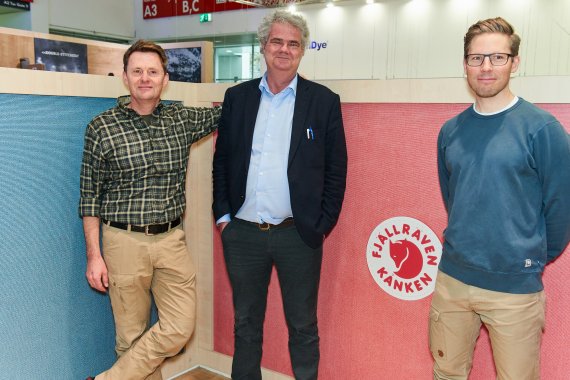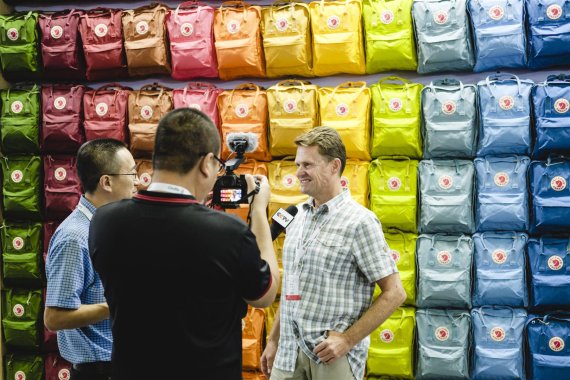
Outdoor specialist Fenix, which includes outdoor heavyweights such as Fjällräven, Hanwag, Primus, Tierra, Naturkompaniet and Globetrotter, will see a generational change this year: Martin Nordin, son of Fjällräven founder Ake Nordin and former CEO of Fenix Outdoor International AG, announces his resignation at the next Annual General Meeting this spring. He is succeeded by Alex Koska and Martin Axelhed becomes Executive Vice President of the Group.
All of them have been with the company for several years. A good opportunity to talk to the new management team about the future plans of the outdoor group. And about Nordins new position: What is an Executive (working) Chairman?
ISPO.com: You have just announced that you will make some management changes. What exactly is your plan?
Alex Koska: It is not about a generational change in the usual sense, but about a necessary step, which is mainly due to growth. Today, we are many times bigger than we were just a few years ago. Not only in terms of turnover, but also in terms of the number of employees. Today we employ well over 2,000 people, compared with 200 in the past, and we intend to adapt and improve our organizational structure with this step.
Martin Nordin: We reached the point where you find out that you have to take the next step. I am a visionary, my strengths lie in creativity and strategy. Others can do the operative business better than me. That's why I resigned and Alex Koska, who has been with the company for a long time and continues to be responsible for the Global Sales segment, will take care of it.
In other words, I am not retiring, I will continue to be actively involved in the company, because there is a great need for strategic decisions on many of the major issues of the future. Hence the name "Executive (working) Chairman". Martin Axelhed, who will continue to take care of the brand management, will become Vice President. As you can see, basically all retain their responsibilities; especially the titles have been changed.
There is also talk of rejuvenation - what does that mean?
Nordin: In this way you make room for younger ones - they get the chance to develop. You must not underestimate that: You create the opportunity for people to gain new experiences that they need to make good decisions in the many areas we cover.
The digitization is seen as a major challenge. What are your goals?
Koska: The overriding goal is: We want to survive in the long run! That sounds banal, but it's not. We see that the big retailers are getting bigger and bigger and the small specialists get smaller and smaller. But we want the small businesses to survive. If you are operating in a premium environment like ours, then you are dependent on this premium network.
Only there we can be sold. Our products need consulting. The technical information can of course be found on the Internet. But to pass on the experience, the actual advice, that can only people. If you can no longer offer this information, only the price is decisive. We don't want it to go that far.
Nordin: When the small retailers are gone, there will be no more technical development in the collection. There is no longer a retailer who can sell it and no customer who understands why he should pay for it. This means that brands must carefully select their distribution strategy if they want to survive!
How exactly do you support the retailer?
Koska: We try to maintain a healthy balance on the market with selective distribution and trustworthy partners. As a result, retailers benefit from stable prices without discount battles and can achieve higher margins.
Further measures include targeted consumer advertising with integrated campaigns and the involvement of retail partners, shop-in-shop systems and other sales promotions. However, it is crucial that the end consumer wants to buy the product and this is where we understand our core task. In our opinion, this is the best retail support.
What will retail look like in the future? What challenges do you see?
Nordin: We firmly believe that, despite all the digitization, there will still be physical stores in the future. Perhaps not exactly as we know it today, because digitization offers a great opportunity, among other things, to better understand the end user and be able to respond to him/her better. A prerequisite for this is a reliable database, which we will build up with a team of specialized employees. We have not hired a consulting firm for this, but we want to do it ourselves.
The aim is to provide data that is as meaningful and specifically tailored to our needs as possible, which should not only help us to address the end user in a more targeted way, but also to better understand the market as a whole. There is currently no reliable data available for the outdoor industry with regard to actual market shares and the overall market in Europe. Much of the information is difficult to interpret - improving it is also part of digitization.
You have your own retail network, an advantage when it comes to using data from retail. How do you digitize trade?
Koska: We measure the frequency within our stores and try to identify patterns of how consumers move around the store and what they find attractive. This is the first step.
Globetrotter was once the prime example of outdoor retail. In the last few years, Globetrotter was not that successful, and sales are declining. What happened?
Nordin: Globetrotter is just catching up! But of course it's true that we were not very profitable lately and need to become more efficient. That's why we are investing in a new logistics center.
Axelhed: It is also interesting that our brand Fjällräven has a greater brand awareness than Globetrotter. That means: Globetrotter is well known where the shops are. So, we have nice big stores, but only few. In the future, we will put much more effort into marketing and online commerce.
Nordin: We are also working on a new store concept that is connected to the ERP system and allows the digital integration of all processes.
Koska: The idea here is that we want to know more about the consumer and therefore systematically collect data. We need more fact-based data and less emotionally driven decisions. We see that again and again - even when evaluating products etc.

What role does e-commerce play for you?
Nordin: Of course e-commerce is part of the business, but it’s no guarantee for survival. Many tend to underestimate costs. The returns are enormous, especially in Germany! This goes so far that we had to take some products out of the assortment because they were not profitable in the end.
Koska: Many products are sent across the country several times before they a customer buys them - that's how it is everywhere in online shops. The customers do not consider that at all. But this is anything but sustainable and still a business model for some!
Keyword sustainability: At Fjällräven, sustainability is a big part of the communication. How important is the topic for the other brands and for the Fenix Group?
Nordin: Everything we do in the area of sustainability is based on our own efforts and runs through the whole company: we have our own CSR department, which is responsible for all brands. Fjällräven is best known for sustainability, but Tierra is probably the most sustainable. Of course, we work in very different areas - clothing, shoes, equipment, retail - and keep learning from each other.
2019 the OutDoor fair takes place in Munich. How do you like that?
Nordin: If OutDoor had stayed in Friedrichshafen longer, it would have failed sooner or later - it became more and more a local show. But we are global, the internationality of the trade fair is decisive for us, and from an international point of view the location was increasingly a problem. That's no secret, I've been saying that for a long time.
What do you expect from trade fairs today? There is a lot of talk about how consumers should have more access.
Nordin: Of course, trade fairs today fulfil a different task than in the past, where the financial value of a trade fair could be read directly from the order. Today it is about seeing our customers and talk to them.
Koska: To discuss the involvement of the end user: We will present the innovations of the coming winter at the trade fair. At this time the current winter collection is still on sale. To be fair to the retailer, we have no interest in showing the end consumer the new products and thus possibly discouraging consumers from buying the current collection.

 Sports BusinessSki Mountaineering Goes Olympic: What Milano-Cortina 2026 Means
Sports BusinessSki Mountaineering Goes Olympic: What Milano-Cortina 2026 Means
- ISPO awards
- Mountain sports
- Bike
- Design
- Retail
- Fitness
- Health
- ISPO Job Market
- ISPO Munich
- ISPO Shanghai
- Running
- Brands
- Sustainability
- Olympia
- OutDoor
- Promotion
- Sports Business
- ISPO Textrends
- Triathlon
- Water sports
- Winter sports
- eSports
- SportsTech
- OutDoor by ISPO
- Heroes
- Transformation
- Sport Fashion
- Urban Culture
- Challenges of a CEO
- Trade fairs
- Sports
- Find the Balance
- Product reviews
- Newsletter Exclusive Area
- Magazine




